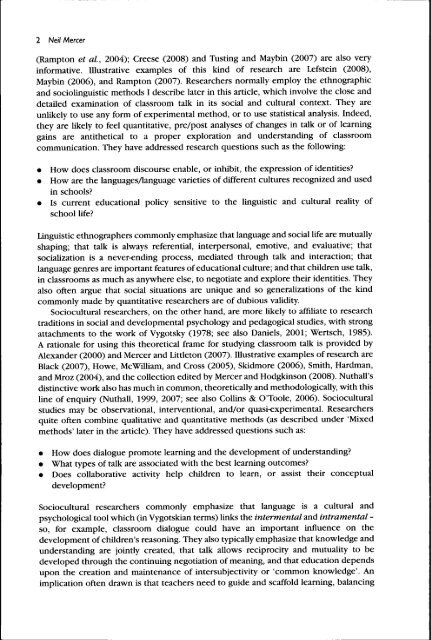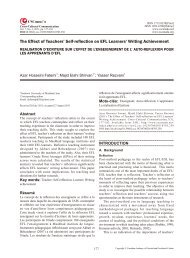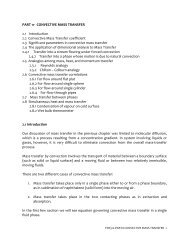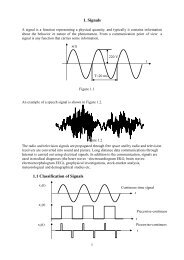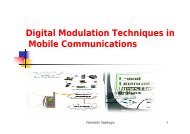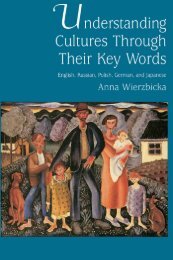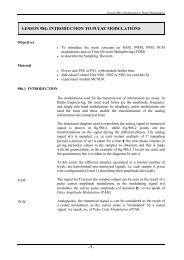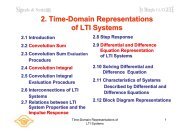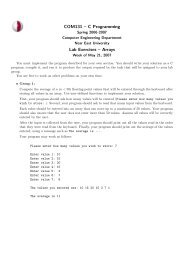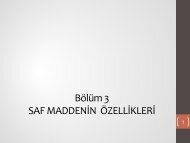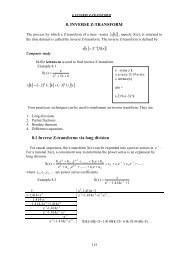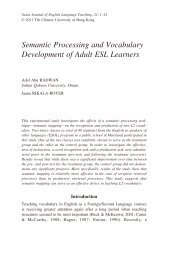(2010). The analysis of classroom talk: Methods and methodologies ...
(2010). The analysis of classroom talk: Methods and methodologies ...
(2010). The analysis of classroom talk: Methods and methodologies ...
You also want an ePaper? Increase the reach of your titles
YUMPU automatically turns print PDFs into web optimized ePapers that Google loves.
2 Ne/7 /VIercer(Rampton et al., 2004); Creese (2008) <strong>and</strong> Tusting <strong>and</strong> Maybin (2007) are also veryinformative. Illustrative examples <strong>of</strong> this kind <strong>of</strong> research are Lefstein (2008),Maybin (2006), <strong>and</strong> Rampton (2007). Researchers normally employ the ethnographic<strong>and</strong> sociolinguistic methods I describe later in this article, which involve the close <strong>and</strong>detailed examination <strong>of</strong> <strong>classroom</strong> <strong>talk</strong> in its social <strong>and</strong> cultural context. <strong>The</strong>y areunlikely to use any form <strong>of</strong> experimental method, or to use statistical <strong>analysis</strong>. Indeed,they are likely to feel quantitative, pre/post analyses <strong>of</strong> changes in <strong>talk</strong> or <strong>of</strong> learninggains are antithetical to a proper exploration <strong>and</strong> underst<strong>and</strong>ing <strong>of</strong> <strong>classroom</strong>communication. <strong>The</strong>y have addressed research questions such as the following:• How does <strong>classroom</strong> discourse enable, or inhibit, the expression <strong>of</strong> identities?• How are the languages/language varieties <strong>of</strong> different cultures recognized <strong>and</strong> usedin schools?• Is current educational policy sensitive to the linguistic <strong>and</strong> cultural reality <strong>of</strong>school life?Linguistic ethnographers commonly emphasize that language <strong>and</strong> social life are mutuallyshaping; that <strong>talk</strong> is always referential, interpersonal, emotive, <strong>and</strong> evaluative; thatsocialization is a never-ending process, mediated through <strong>talk</strong> <strong>and</strong> interaction; thatlanguage genres are important features <strong>of</strong> educational culture; <strong>and</strong> that children use <strong>talk</strong>,in <strong>classroom</strong>s as much as anywhere else, to negotiate <strong>and</strong> explore their identities. <strong>The</strong>yalso <strong>of</strong>ten argue that social situations are unique <strong>and</strong> so generalizations <strong>of</strong> the kindcommonly made by quantitative researchers are <strong>of</strong> dubious validity.Sociocultural researchers, on the other h<strong>and</strong>, are more likely to affiliate to researchtraditions in social <strong>and</strong> developmental psychology <strong>and</strong> pedagogical studies, with strongattachments to the work <strong>of</strong> Vygotsky (1978; see also Daniels, 2001; Wertsch, 1985).A rationale for using this theoretical frame for studying <strong>classroom</strong> <strong>talk</strong> is provided byAlex<strong>and</strong>er (2000) <strong>and</strong> Mercer <strong>and</strong> Littleton (2007). Illustrative examples <strong>of</strong> research areBlack (2007), Howe, McWilliam, <strong>and</strong> Cross (2005), Skidmore (2006), Smith, Hardman,<strong>and</strong> Mroz (2004), <strong>and</strong> the collection edited by Mercer <strong>and</strong> Hodgkinson (2008). Nuthall'sdistinctive work also has much in common, theoretically <strong>and</strong> methodologically, with thisline <strong>of</strong> enquiry (Nuthall, 1999, 2007; see also Collins & O'Toole, 2006). Socioculturalstudies may be observational, interventional, <strong>and</strong>/or quasi-experimental. Researchersquite <strong>of</strong>ten combine qualitative <strong>and</strong> quantitative methods (as described under 'Mixedmethods' later in the article). <strong>The</strong>y have addressed questions such as:• How does dialogue promote learning <strong>and</strong> the development <strong>of</strong> underst<strong>and</strong>ing?• What types <strong>of</strong> <strong>talk</strong> are associated with the best learning outcomes?• Does collaborative activity help children to leam, or assist their conceptualdevelopment?Sociocultural researchers commonly emphasize that language is a cultural <strong>and</strong>psychological tool which (in Vygotskian terms) links the intermental <strong>and</strong> intramental -so, for example, <strong>classroom</strong> dialogue could have an important influence on thedevelopment <strong>of</strong> children's reasoning. <strong>The</strong>y also typically emphasize that knowledge <strong>and</strong>underst<strong>and</strong>ing are jointly created, that <strong>talk</strong> allows reciprocity <strong>and</strong> mutuality to bedeveloped through the continuing negotiation <strong>of</strong> meaning, <strong>and</strong> that education dependsupon the creation <strong>and</strong> maintenance <strong>of</strong> intersubjectivity or 'common knowledge'. Animplication <strong>of</strong>ten drawn is that teachers need to guide <strong>and</strong> scaffold learning, balancing


